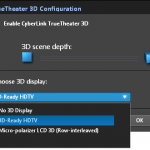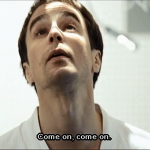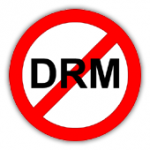I thought about posting some kind of April Fools post, but these are always tricky (in more than one sense of the word). There’s always the chance that people will see right through it, or that nobody will even read it, let alone get tricked by it. And then there’s always the chance that whatever you made up is considered libelous, and then you’ll have to go to court and all that stuff. You can always make up stuff about yourself, but after a stupid joke I posted a while back about quitting the WNR, and having been flooded with emails in response to it, I’m a bit weary. So no 3D version of the WNR is coming, I’m not going to stop writing it because I’ve been offered a job by the MPAA, Sony isn’t renaming Blu-ray to HD DVD to get more DVD owners to upgrade, The Pirate Bay isn’t going to go legit (yet), Microsoft Natal will not require you to wear a body suit, etc …
I finished the review for PowerDVD 10. There used to be very little between WinDVD and PowerDVD, but right now, PowerDVD has added a lot more features that WinDVD just does not have. 3D, movie collection manager, online features, Twitter/Face book support – it’s all making PowerDVD a better value package, and more future proof. I also noted some performance improvements in the new PowerDVD version, although it may be down to better ATI drivers than anything else. Apart from that, not a huge week for news, not for real news anyway, so let’s get on with it.

In copyright news, the Ubisoft DRM story refuses to go away, and this time, it’s because the DRM server refuses to serve anyone here in Australia, for some unknown reason.
Australian buyers of Settlers 7, which is one of the new Ubisoft games that utilises a DRM that requires a constant Internet connection, found that they could not connect to the DRM server. Ubisoft claims its some kind of issue with linking authentication keys with multiplayer profiles, so basically acknowledging it is in fact a DRM related problem. Once again, legitimate paying customers have to suffer. But this DRM appears difficult to crack, since a lot of the files you need to play the game are stored on the DRM servers, and so, it’s not something you can trivially crack. It’s certainly harder than EA’s effort with Command & Conquer 4. So for now, paying customers that can’t play the game have no choice but to wait for Ubisoft to fix the problem. For a big problem like the Australian one, Ubisoft may respond eventually (certainly not in a very quick fashion). For more obscure problems that only affect a few users, do you really think Ubisoft is going to bother to do anything about it? For those that are unlucky, waiting for the hackers to do something may be your best chance, and this is despite paying for the game.
While this DRM is simply annoying, there’s a new DRM in Japan that’s simply embarrassing – made more so because it was for an adult game. What happened was that the makers of the game released a fake crack on the bittorrent networks, and when installed, it takes a screenshot of your desktop and posts it online at a public website. The only way you can get the screenshot removed is to admit to the fact that you are a pirate. Technically speaking, this isn’t much of a DRM, as a trojan. There are trojans that take a screenshot of your browser while you’re entering your credit card info, for example, and this is no different. Not sure this would go down well in other countries though, since trojans and other malware, despite the intentions, may be illegal. The fake installer does come with a service agreement that spells out exactly what the program does, but hardly anybody reads those, right? And do pirates deserve this kind of treatment? Perhaps they only have themselves to blame.
If all of this pirate catching sounds like fun to you, then Warner Bros. may just have a paying job for you. They are asking for applications to a position called “anti-piracy intern”. What you have to do is to catch pirates, send infringement notices, go undercover and join private torrent websites so you can spy on their activities, and even write bots (which may just one day turn into the trojan described above). No experience, other than knowing how to download pirated content, is needed, and there’s plenty of people with this kind of experience. And I’m sure to prove that what you downloaded was indeed pirated, you’ll have to enjoy it first to make sure that it is the real thing, and you get paid while doing all of this. Sure, you may have to turn in your friends and make new ones with the goal of getting evidence of their illegal activities, but that’s what being undercover is all about.
Mass litigation, or the threat of litigation, has been under the spotlight in the UK, with several law firms being investigated for possible deceptive practices. However, that hasn’t stopped the same things being tried in the US, with thousands being accused of piracy and asked to pay a settlement fee or go to court. It’s the same old trick – get a bunch of IP addresses of people who connected to the torrent tracker (but with no evidence that any of them downloaded a complete copy of the film), get their addresses from the ISP through a court order, and then send out letters demanding payment or face going to court, and those too scared to lawyer up will pay up. And there’s almost always no intention of going to court by the suing party, for fear of a unfavourable judgement, because they know they’re on shaky grounds when it comes to the case itself. This latest US effort, headed by a firm called the US Copyright Group, also has the cooperation of a few independent filmmakers, including the infamous Uwe Boll.
For those that don’t know, Uwe Boll is the worst filmmaker in the world. That’s not an exaggeration at all. When you make one bad film, like the director of Gigli, that’s understandable, and in defence of Martin Brest, the director of Gigli, he also directed the excellent Scent of a Woman and the funny Beverly Hills Cop. But when you consistently pour out crap movies like Uwe Boll has done, many with no more than 2 or 3 stars on IMDb, then it might just be time to give up the trade. Some movies are so bad that they’re good. Boll’s movies are so bad, they’re worse. So it was no surprise that Boll would be involved in this, as this is probably his best chance to make some money from his movies. What is surprising, and disturbing, is that people are downloading Uwe Boll movies online. Maybe it seemed exciting and different at first. Maybe your friends are doing it too. Maybe you think you’ll only do it once. But don’t be fooled. Uwe Boll movies are bad. Really bad. Just say no to Uwe Boll movies.
As if being sued by Viacom wasn’t enough, YouTube might be facing lawsuits from others, this time, software companies. Apparently, YouTube is now a popular destination for those wanting to pirate software, as there are now tons of videos on how to get things illegally. The reason is that videos on YouTube occasionally make it to the top of Google’s ranking due to Google’s preferential treatment of YouTube, and this allows pirates to get hits to their websites and also to make money directly from Google. When Google paid Twitter so it can display Twitter feeds within Google, usually near the top of the search results, it resulted in an increase of Twitter spam to similar effect. And spam or scam or piracy, getting to the top of Google could be very profitable. Speaking of the Google/Twitter deal, the more cynical minded might have seen it as an attempt by Google to sabotage Twitter by making it more of a spam target, which will help Google’s own Buzz in the process. Hmm…

Again, not much happening in HD/Blu-ray world. It’s still too early to get really into 3D, and there hasn’t been the steady stream of A-list titles, like during the last quarter of 2009, that’s making the headlines.
The 3D stuff, I’m still not sure how to feel about it. On one hand, I would like to have it, but then I think of the cost, the discomfort of wearing those glasses, and I’m not sure how often I would actually use it as a result. I’ve set up a poll on this very issue here. Speaking of polls, the last one I ran was about Blu-ray for the PC. 58% of those surveyed, in this very unscientific poll, said they won’t be getting a Blu-ray drive for their PC anytime soon. Nearly 26% said they already have a drive, with a further 15% saying they might get one soon. I’m not sure what this means, but I thought it was interesting.
![]()
And in gaming, although it could possibly be in the copyright section, the PS3’s new firmware update has removed Linux and “other OS” support from the fat PS3s. The PS3 Slim had this option removed from release, but the older fat PS3s could still run Linux, which was opening up all sorts of new applications, particularly in the area of game emulation.
Some say this is a cost cutting move, as continued software support for “other OS” was delaying PS3 firmware development. Others, again the more cynical, may suggest this is a pre-emptive strike at hackers, who are just beginning to get the better of the PS3’s anti-piracy features. And the aforementioned game emulator developments would not be in Sony’s interest either, since it sells classic games via the PlayStation store.
There’s only a small number of people who use Linux on the PS3, so this won’t affect many people. However, Sony had promoted the PS3 as a console that could do everything, and the “Other OS” feature was one they promoted heavily. Another was the fact that Sony promised to add new features via software, but it seems they’ve done the opposite here. It’s because of this that the angry noises at this announcement are louder than what Sony might have expected. The rumours that PS2 backwards compatibility might be the next one to go, and if that were the case, then Sony should expect far louder levels of disapproval. Although if they did it, they might make it up to gamers by creating a software emulator for the PS2 that can be purchased from the PS store (and free for those with consoles that had hardware backwards compatibility). I suspect if a PS2 emulator is to arrive, it will be after Sony officially declares the end of line for the PS2.
And that’s all I have for the week. More next week hopefully, although my new MPAA job will mean less free time to find news.
(still just kidding)



















